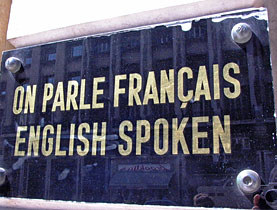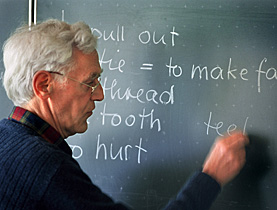Linguists unite against English invasion

Largely unnoticed by English speakers, our fellow Europeans are sullenly suffering the colonisation of their native languages by Anglo-American terms.
Linguistics experts met in the Swiss capital Bern on Tuesday to share ideas on how to deal with the growing language divide within French, German and Italian-speaking communities.
Who can get by these days without knowing the meaning of whistleblower, laptop, roaming or task force? They are all words that have entered into common usage in Swiss national languages.
Behind the laughter at the many comic examples of pseudo-English which have popped up, there is dismay at the unstoppable stream of borrowings and fear for the very survival of the continent’s languages.
Guest speaker Alfred Gilder, terminology chief at the French finance ministry, captured the mood of the conference with the battle-cry “modernise or die!”.
“If a language is not capable of creating new words to describe new advances, it will die,” he warned.
Gilder summed up his philosophy of linguistic integrity by using a drinking metaphor. “I like Bordeaux very much and I like whisky too but I would never mix the two!”
Beginning of the end
A point echoed by several speakers was that English has become so dominant in certain fields, such as finance and science, that courses in some disciplines are now exclusively being taught in English in some countries. The beginning of the end, as Gilder sees it.
The conference, attended by some 200 delegates, was organised by the Swiss Federal Chancellery.
Vice-chancellor Thomas Helbling told swissinfo.ch that Switzerland, with its tradition of language diversity had possibly less to fear from the influence of English. But he stressed that the home languages needed to be preserved.
“I definitely think that we should learn a second national language before English. It is part of our tradition and culture to speak to each other, as you can see at today’s conference where three languages are in use on the floor.”
Global dominance
Of course borrowing words and expressions from other languages is a natural function of language development and English itself has absorbed countless influences in its history – from Latin, French and Hindi, to name but a few.
What is different about the current dominance of English is that it is the first truly global language and it is spewing out words at a pace that other languages have no chance to compete with.
This rapid evolution favours those who can ride the English wave but creates a language divide, akin to the digital divide, for those who are poor in English.
Germanic expert Jürg Niederhuaser illustrated this problem neatly by quoting the head of a research department in a Basel pharmaceutical company, who said:
“In the section I lead, people like to joke that without English you won’t get so much as a cup of coffee.”
Uniformity
Bénédicte Madinier, another guardian of the French language who works for the French Ministry of Culture, spoke of the linguistic uniformity that is fast becoming established worldwide.
“It is not a question of denying the interest, the necessity of an international language of communication, a lingua franca, …. What must be avoided is that the lingua franca becomes lingua unica,” Madinier said.
Madinier has a role in the French establishment’s complex system of screening new English words and either approving them for adoption into French or coming up with a new French form.
The French can boast to have possibly the only language on the planet which put forward its own version of the word computer which is still in popular usage – “ordinateur”. But such victories are few and far between.
False friends
The English influence is so pervasive now that languages are cobbling together words that either exist in a different form or mean something quite different in English.
So you want to get your hair done? In French-speaking Switzerland you have to ask for a “shampooing” followed by a “brushing”. Those crow’s feet bothering you? It might be time for a “facelifting”.
Or perhaps you want to order an overhead projector for your speech? That will be a “beamer” to your Swiss hosts. And if you happen to point out a vintage car to a German-speaker, don’t forget to call it an “oldtimer”.
Last but not least is “last but not least”, the most overused English expression among the Swiss, which pops up without fail in every speech and presentation, as any English speaker living here will testify.
Clare O’Dea, swissinfo.ch
Working poor, Handy (mobile phone), Feeling, Hobby, Babysitter, Job, CEO, Flyer, Speech, Fair Play.
Fitness (gym), kick off, team, networking, outsourcing, task force, chat, snob, start-up, dealer, squatter, unplugged.
Golf (jumper), box (garage parking space), bypassare, softwerista, stalking, pool de creatività.
All things financial: Sub-prime, low-cost, cash flow, offshore, trader;
All things online: network, cloud computing, spam, ADSL, e-learning, e-government;
All things -ing: Parking (car park), camping (campsite), lobbying, smoking (dinner jacket);
All things corporate: top manager, customer service, team-building, handout, best practice;
All things current: Blackberry, tweet, speed dating, podcasting, blog, spin doctor;
All things sporting: Goal, free kick, match, coach.

In compliance with the JTI standards
More: SWI swissinfo.ch certified by the Journalism Trust Initiative












You can find an overview of ongoing debates with our journalists here . Please join us!
If you want to start a conversation about a topic raised in this article or want to report factual errors, email us at english@swissinfo.ch.